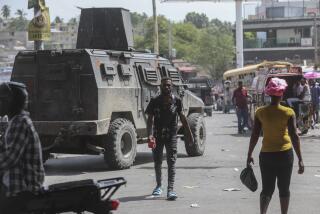Albright Defends Rwanda Troop Delay : United Nations: Sending extra 5,000 peacekeepers now would be ‘folly,’ ambassador says.
- Share via
WASHINGTON — U.N. Ambassador Madeleine Albright, defending a U.S.-inspired delay in the dispatch of almost 5,000 additional peacekeeping troops to Rwanda, told Congress on Tuesday that “sending a U.N. force into the maelstrom of Rwanda without a sound plan of operations would be folly.”
She hailed the delay as the first fruits of President Clinton’s recent presidential directive that promised to subject all proposed peacekeeping missions to tough questioning and rigorous study before allowing the Security Council to approve them.
The council, meeting in the early hours Tuesday, authorized an expansion of the mission in ravaged Rwanda to 5,500 troops but, at U.S. insistence, will delay sending more than a few hundred until Secretary General Boutros Boutros-Ghali can come up with hard evidence satisfying the Clinton Administration that the larger numbers make sense.
Although the 15-member Security Council passed the resolution unanimously, the delay troubled some. New Zealand Ambassador Colin Keating, for example, told the council, “I cannot conceal my delegation’s disappointment that this resolution only approves a very modest first phase of the expanded United Nations presence, which we believe is essential in Rwanda.”
Under the resolution, the United Nations would immediately send 500 Ghanaian troops to augment the pared-down U.N. force of 444 peacekeepers now guarding the airport in the Rwandan capital of Kigali. The United Nations would send back 175 military observers who had been evacuated to Nairobi after Rwanda exploded in bloody carnage in April. Boutros-Ghali has estimated that 200,000 people have died and 2 million have fled their homes since then.
Under the resolution’s mandate, peacekeepers would be charged with protecting displaced people, establishing secure humanitarian areas to feed and house refugees and providing security for humanitarian relief operations.
Although the resolution describes the turmoil as “a humanitarian crisis of enormous proportions” and expresses alarm at “continuing reports of systematic, widespread and flagrant violations of humanitarian law,” the council conditioned the dispatch of the rest of the authorized troops on the results of a future report by the secretary general.
In this report, he would have to satisfy the council that both sides in the civil war accepted the peacekeepers, that a cease-fire was in sight, that there were troops available for the Rwanda mission and that the United Nations had an idea of how long the mission needs to stay in Rwanda.
These conditions, inserted at American insistence, amounted to the same ones that Clinton had set down in his directive for U.S. approval of peacekeeping operations.
In testimony before a House Foreign Affairs subcommittee, Albright said that rushing large numbers of troops into Rwanda “would not save Rwandan lives and would likely cost the lives of more U.N. peacekeepers.”
The Security Council session, which ended after midnight, was charged with emotion because of the slaughters that have taken place in Rwanda since its president and the president of Burundi--members of the Hutu tribe--died in a mysterious plane crash at Kigali’s airport.
“The crocodiles in the Kagera River and the vultures over Rwanda have seldom had it so good,” Czech Ambassador Karel Kovanda told the Security Council. “They are feeding on the bodies of the thousands upon thousands of children and women, hundreds of which were pregnant, and men, who have been hacked to death during the past six weeks by what has turned out to be a most vicious regime.”
Rwanda is a Security Council member, and the foreign minister of that regime, Jerome Bicamumpaka, attended the meeting and cast the only vote against a section of the resolution imposing a Rwandan arms embargo. He later voted for the resolution as a whole. Bicamumpaka blamed the killings on “hatred derived from the oppression of the Hutu majority by the Tutsi minority.”
New Zealand’s Keating objected to Bicamumpaka’s appearance at the council meeting. “He has no legitimacy and is merely the mouthpiece of a faction,” he said.
More to Read
Sign up for Essential California
The most important California stories and recommendations in your inbox every morning.
You may occasionally receive promotional content from the Los Angeles Times.












